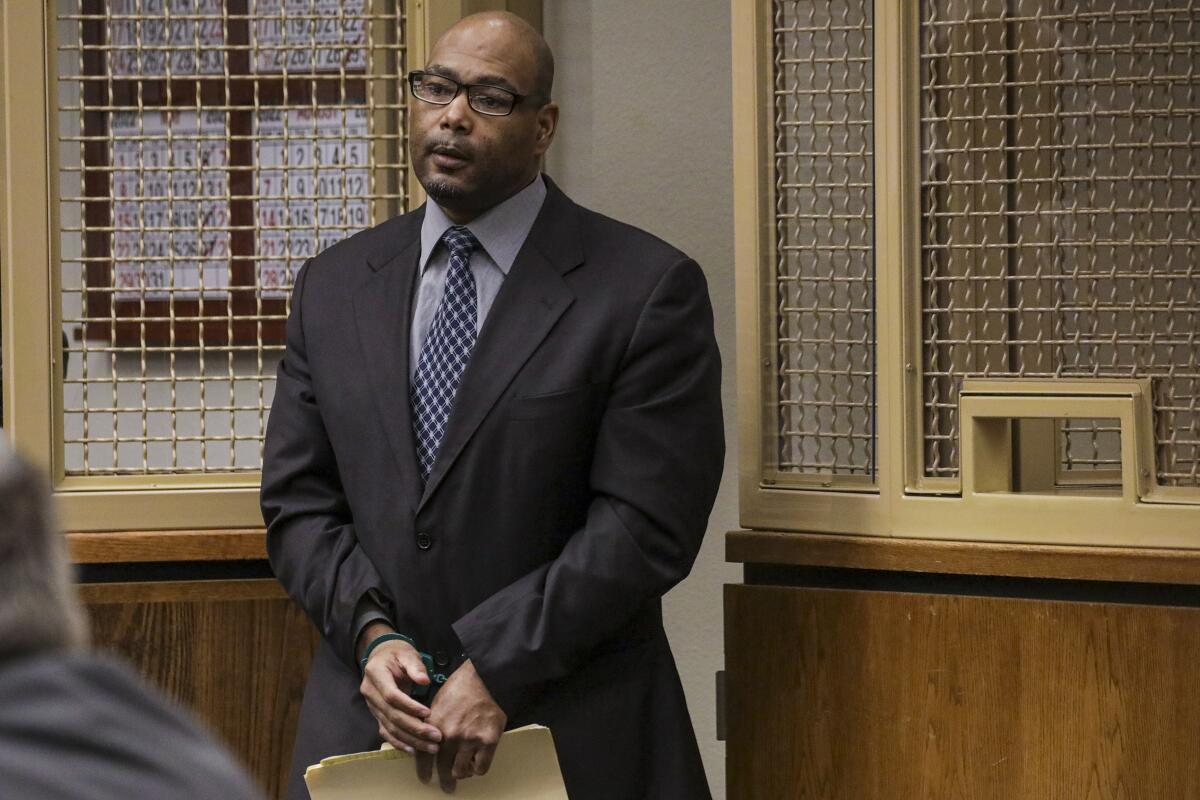Appellate court rejects Racial Justice Act appeal in Newport Beach double murder case

A state appeals court panel on Friday upheld the conviction of a man who killed a couple in Newport Beach, rejecting a defense argument that Orange County District Atty. Todd Spitzer violated the recently enacted Racial Justice Act through comments he made while considering whether to pursue the death penalty in the case.
Jamon Rayon Buggs was convicted in May 2022 and sentenced in June of that year to two life-without-parole prison terms for killing 48-year-old Wendi Sue Miller of Costa Mesa and 38-year-old Darren Donald Partch of Newport Beach in 2019. The two were found dead in Partch’s residence at Villa Siena, 2101 E. 15th St.
Just before sentencing, Orange County Superior Court Judge Gregg Prickett said Spitzer violated the Racial Justice Act during discussions with prosecutors about whether to seek death for Buggs, when Spitzer suggested that Black men date white women to elevate their status in society, pointing to conservative talk show host and former gubernatorial candidate Larry Elder as an example.
The comments surfaced when Ebrahim Baytieh, who was then a high-level prosecutor in the office but is now an Orange County Superior Court judge, memorialized the discussion in a memo. Spitzer argued that he raised the issue because of issues with cross-racial identification, which often lead to the overturning of convictions when witnesses’ racial biases can lead to accusing the wrong suspects.
Spitzer said he believed it was an issue in the case since Buggs killed Miller, who was white, because she was spending the night with Partch, who had been acquainted with Buggs’ ex-lover, who was also a white woman.
According to trial evidence, Buggs was hunting down boyfriends of his ex-girlfriend even though Partch had only briefly met Buggs’ ex-lover once and decided not to date her after getting an angry phone call from Buggs.
Spitzer vehemently denied violating the Racial Justice Act, but his office ultimately opted not to seek the death penalty. The case was assigned to a new prosecutor, and Spitzer “walled off” the case from himself and anyone else involved in the meeting when the comments were made.
In Friday’s appellate ruling, Presiding Justice Kathleen E. O’Leary of Division Three of the Fourth District Court of Appeal agreed that Spitzer had remedied the error, removing the bias against Buggs.
“We address Spitzer’s actions despite him adamantly denying he violated the RJA,” O’Leary wrote. “His actions suggest he actually understood his transgression. Spitzer admitted he took measures to cure any harm. He assigned the case to an experienced homicide prosecutor who had no knowledge of what transpired at the [death penalty discussion] meeting. He ‘walled off’ everyone involved with the [death penalty] meeting from the prosecution. Most significantly, he decided to not seek the death penalty and noted this was a remedy in the RJA.”
O’Leary added, “Despite Spitzer’s reluctance to acknowledge his expressed racial bias, he took steps to remedy the harm to Buggs’ case and to the integrity of the prosecution. The trial court clearly understood Spitzer took the steps necessary to prevent racism from infecting the criminal proceeding and nothing further was required under the statute.
”... The record before us demonstrates the court found Spitzer violated the RJA when he made racially discriminatory statements during the meeting when considering whether to pursue the death penalty. The appropriate remedy, no death penalty, was specific to the violation the trial court found. On this record, Buggs has not established there was a miscarriage of justice.”
Buggs argued that Prickett could have also granted a new trial, dismissed charges or imposed concurrent sentences, but Buggs failed to seek those remedies at trial “and thus forfeited his contentions,” O’Leary wrote. “But, as discussed, no additional remedy was necessary.”
O’Leary added that since the new law is meant to eliminate racial bias in the criminal justice system in the state, “it would seem counterproductive to fail to acknowledge remedial actions taken by a district attorney, prior to any intervention by the court, to eliminate any aspect of racial bias arising from the prosecution. The unintended consequence of ignoring the actions of the prosecution may be to encourage the prosecution not to self-correct but rather wait to see what the court may do. Instead, we want to encourage the prosecution to avoid instances of racial bias and when discovered to immediately and appropriately address the issue. But for the somewhat unusual revelation of internal OCDA correspondence and Spitzer’s actions, this conversation may never have come to the trial court’s attention.”
All the latest on Orange County from Orange County.
Get our free TimesOC newsletter.
You may occasionally receive promotional content from the Daily Pilot.



